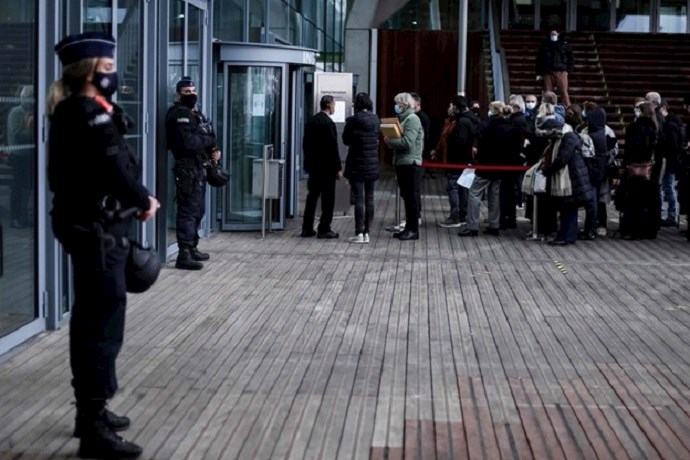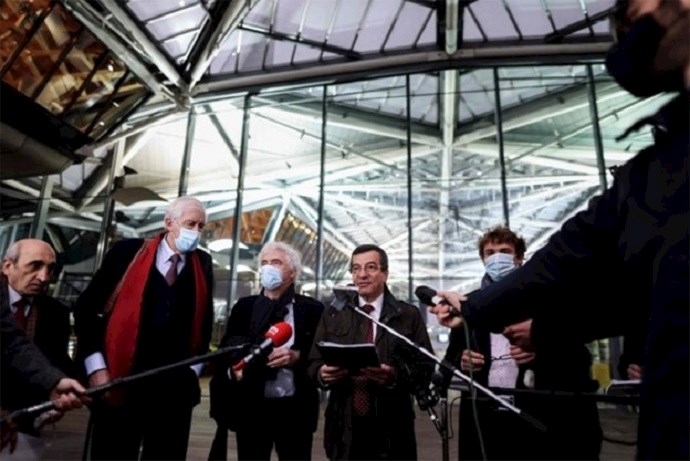Analysis by PMOI/MEK
Iran, November 27, 2020—For the first time in history, an Iranian diplomat is trialed in Europe on charges of plotting a terror attack, a rare, exceptional, and important development, according to many western media.
Assadollah Assadi, the Iranian diplomat, is standing trial today in Antwerp, Belgium, for leading three terrorists to plot a bomb at the annual gathering of the Iranian opposition movement the National Council of Resistance of Iran (NCRI) on June 30, 2018, in Villepinte, near Paris.
The evidence found during the judicial process against Assadollah Assadi, who is the third counselor of Iran’s embassy in Vienna, Austria, left no doubt that the entire regime was involved in a terrorist act in 2018 on European soil.
For many years, Assadollah Assadi recruited three Belgian-Iranians, including the couple Amir Saadouni and Nasimeh Naami, and delivered 500 grams TATP explosives. The three met on June 28, 2018, in a Pizza Hut in Luxembourg City where Assadi, known as Danial to the couple, provided them the bomb and 22,000 euros in cash.
According to Belgian National Intelligence the VSSE, Assadi had carried out the bomb from Tehran with an economic flight.
In the months that led to the operation’s appointed date, Assadi regularly traveled from Vienna to Tehran, sometimes for a short visit of two or three days.
Finally on the eve of the attack, European authorities arrested Assadi and his accomplices shortly after the delivery of the explosives, foiling the plot hours before it could have caused massive casualties at the Free Iran Rally, where tens of thousands had gathered.

Strict security measures at the Vlinder Justice Palace of Antwerpen on the day Assadollah Assadi’s trial begins.
When it comes to the Iranian regime, bombing plots and assassinations are nothing new. Tehran has made terrorism the hallmark of its foreign policy in the past four decades. But what makes this case unique is an Iranian diplomat being directly involved in the attack and caught in the act.
Since Assadi’s arrest, the regime has led many failed efforts to intimidate Belgian Justice to free its terrorist agent on grounds of diplomatic immunity.
In almost every diplomatic contact the regime offered financial and trade compromises. However, the regime failed in the last two years to stop the trial from happening.
Back in July, Reuters reported that Assadi even threatened the Belgium authorities for possible retaliation if condemned. He literally said “armed groups in the region are very interested in the outcome of your investigation. They will act if the court ruling is not in their favor.”
Blackmail and hostage-taking tactics
The regime also resorted to an old page in its playbook to apply pressure on European authorities: taking dual nationalities as hostages. On the eve of the trial, the regime threatened to execute Swedish-Iranian professor Ahmad Reza Djalali, who has been held hostage since 2017. This is yet another example of mullahs’ regime policy of blackmailing in the last 40 years.
In the past two years, the tireless legal efforts of the Iranian Resistance, the presence of numerous prominent figures and personalities as plaintiffs in the case, and the existence of undeniable and shocking evidence have prevented the regime from escaping justice.
Targeting the Iranian resistance
Why did the regime take such high risk and directly involved its diplomat in handing over the bomb to the operatives? The answer is that, at the time, the regime had just recovered from a nationwide uprising, with people in dozens of Iranian cities chanting anti-regime slogans such as “down with Khamenei,” “down with the dictator,” “down with the principle of velayat-e faqih,” and “For 40 years we shed bloodied tears, enough is enough, we’ll take a stand.” These slogans echoed the Iranian people’s desire to overthrow the mullahs and establish freedom and democracy. The regime’s own officials acknowledged that the People’s Mojahedin Organization of Iran (PMOI/MEK), a key member organization of NCRI, played a key role in organizing and leading the protests. Therefore, the regime sought at any cost to eliminate the main threat to its rule.

Farzin Hashemi, the legal representative of the NCRI, at a press conference at the Antwerp court in Belgium.
But the real question remains whether the regime could run away from the political and legal consequences of the trial? Certainly not. The regime has failed until today to delay or revoke the trial. As the NCRI announced in its statement at the court, it is time to hold accountable the regime leaders for their “state-organized terrorism.”
Simultaneous with the trial of Assadi in Belgium, Mrs. Maryam Rajavi, the President-elect of the NCRI, said: “The independent and professional investigations by Belgian Judicial authorities are commendable. As these investigations have shown, we are facing a case of organized state terrorism. As such, in addition to those being prosecuted in this court today, the time has time for the Iranian regime’s leaders to be prosecuted as well.”
The European Union and member states are being judged by the court of public opinion to end the policy of silence vis-à-vis the regime’s terrorism and adopt a decisive policy towards Iran’s medieval regime. This decisive policy must include following steps:#Iran pic.twitter.com/hqnQkxhBwo
— Maryam Rajavi (@Maryam_Rajavi) November 27, 2020





